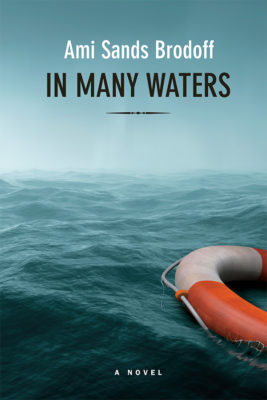It’s the middle of the night. Your vessel: a worn, wooden, overcrowded fishing boat. Even if you survive the Mediterranean’s choppy waters and reach foreign land, your life as a refugee is destined for danger. Given the risks, just how desperate would you need to be to climb aboard?
This is the kind of question that floods your heart as you dip into Montreal author Ami Sands Brodoff’s timely new novel, In Many Waters. The native New Yorker’s prologue, “Lost at Sea,” calls compassionate attention to the continuing refugee crisis: “After Baba disappeared, the terror grew. Menacing calls, death threats scrawled onto the front of their house,” recalls 17-year-old Aziza, fleeing Libya. When her boat capsizes, she drifts alone on her back, wondering how long she can hold on. “Black night rolled into white-hot day folding into night and then again the stinging sun, fierce as a bright, hot mouth.”

In Many Waters
Ami Sands Brodoff
Inanna Publications
$22.95
paper
320pp
9781771333658
Family secrets emerge thanks to Zoe’s research, upping the intrigue. The missing and deceased swim like ghosts throughout, filling pages with their own desires. In Many Waters is saturated with a sense of longing, characters craving those who are gone. “Zoe had weathered so many losses, absence had become a kind of presence,” observes the heroine, summing up an important theme.
Particularly poignant chapters, entitled “Memento Mortis,” have characters address their loved ones directly in the first person. “Dad, remember you and me in the water, any water?” asks Cal. Rescuing Aziza summons boyhood memories of nocturnal swims with his father: “If I was already in bed, you’d lift and carry me down to the lake. When I opened my eyes, I saw the black water, the dark warm, like a person. You were the dark, you were the water. I rode your back as if you were a porpoise, smooth, sleek, faster than anything. … I wasn’t scared. Loved that grey-green-water-world. You were out there with me tonight, Dad. In the water, you know my name.”
Cal, Zoe, and Aziza’s alternating viewpoints, along with those of Cal and Zoe’s mother and estranged aunt, Yael, are expressed in separate chapters. Given the size of the cast, which includes grandparents, a nanny, and others, and the number of locations covered – Tripoli, New York, Montreal, Valletta, Gozo, Marrakech, Mexico’s Oaxaca Coast – things might have gotten messy in the hands of a less agile writer. Yet Brodoff slides easily between perspectives and places, as well as back and forth through the years.
The common landscape throughout the novel is water. It is a place where trauma is born, yet also where it comes to bathe and heal. Linking characters through their losses, this absorbing novel treads the deep end of human experience, mining stories of love and resilience that ripple through time.mRb






0 Comments